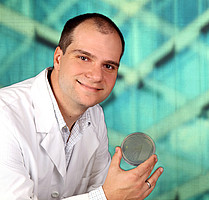End of this page section.
Go to overview of page sections.
Begin of page section: Additional information:
End of this page section.
Go to overview of page sections.
Secretome
Begin of page section: Contents:
The gastrointestinal (GI) tract of humans is home to a dynamic microbial community with more than 100 trillion members, most of them uncharacterized. The gut microbiota and the host engage in a myriad of immunogenic and metabolic interactions. These bacteria also inhibit proliferation and host colonization by pathogens. The gut microbiota thus has a pivotal role in homeostasis. Once perturbed, a condition called dysbiosis, the altered microbiota can also trigger GI diseases such as colorectal cancer (CRC), inflammatory bowel diseases (IBD), severe diarrhea, food intolerance and GI infections. Diarrheal diseases are one of the ten leading causes of death (~ 1.5 million/yr) worldwide.
Microbial interactions with host cells involve surface–associated and secreted bacterial products. The latter diffuse into regions bacteria may not reach and thereby penetrate deeper tissues or spread systemically. Effectors range from single molecules [e.g.: peptides, oligosaccharides, (glyco)-lipids] to complex aggregates with multifactorial composition. An immense range of potential bioactivities is permitted by their highly diverse chemistries. Two key challenges facing the field are first, to identify which of the thousands of microbiota-derived products can be linked to a specific host response at physiologically relevant concentrations, and second, design experiments to elucidate bioactivities in a complex milieu. In this project we apply highly innovative and comprehensive approaches to investigate two important classes of bacterial effectors and their delivery systems (i.e.: tilivalline and membrane vesicles). Each model has features excellently suited to addressing these challenges. Further, each system exhibits a dual (Jekyll & Hyde) capacity for pathological effects as well as great therapeutic promise, which strengthens the perspective for very high scientific impact. Our goal is to gain a molecular understanding of the (patho)physiological effects of the chosen metabolite und membrane vesicle models. We believe the key challenge in microbiome research is to move from a descriptive to a mechanistic understanding of the human microbiota. This transition is critical in the field not just for fully appreciating the impact of these organisms on host health, but also for harnessing this knowledge to treat disease.

Principal Investigator
Assoz. Prof. Dipl.-Biol. Dr.rer.nat. Stefan Schild
Institute of Molecular Biosciences
University of Graz
Curriculum Vitae
Project Members
Univ. Prof. Dr. Rolf Breinbauer, PhD, Institute of Organic Chemistry, Graz University of Technology
Curriculum Vitae
Univ.-Prof. Dr. med. univ. Gregor Gorkiewicz, Institute of Pathology, Medical University of Graz
Curriculum Vitae
Ao Univ.-Prof. Dr. med. univ. Christoph Högenauer, Division of Gastroenterology and Hepataology, Medical University of Graz
Curriculum Vitae
Univ. Prof. Dr. med. univ. Herbert Strobl, Institute of Pathophysiology and Immunology, Medical
Curriculum Vitae
Ao. Univ.-Prof. Dr.rer.nat. Ellen Zechner, Institute of Molecular Biosciences, University of Graz
Curriculum Vitae
End of this page section.
Go to overview of page sections.
